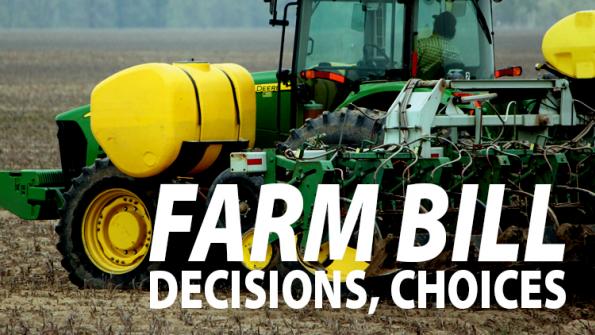February 25, 2015

Editor’s note: Anita Wilson is an agricultural program specialist with the Arkansas FSA. Bobby Coats is a professor with the University of Arkansas Division of Agriculture.
What is the payment yield for PLC?
The current program payment yield under the 2014 Farm Bill is the farm's counter-cyclical (CC) yield in effect on Sept. 30, 2013. The owner of the farm may choose to update the CC yield; this yield will be used to calculate PLC payments on the farm.
What happens to my farm’s base acres and yields if the owner does not allow an update?
The farm will retain the base acres and counter-cyclical yields in effect on Sept. 30, 2013, excluding upland cotton base acres for the 2014 - 2018 ARC/PLC programs. Upland cotton base acres are automatically converted to generic base, which is not part of the base reallocation decision.
Can you simply explain the PLC program?
The PLC program provides payments when the market year average price for a covered commodity falls below the crop's reference price specified in the 2014 farm bill.
 Does the 2014 farm bill allow separate PLC yields for dry land and irrigated practices on the same farm?
Does the 2014 farm bill allow separate PLC yields for dry land and irrigated practices on the same farm?
No. Farms will only have one yield. The PLC yield for a crop that is both irrigated and non-irrigated will either be the farm's current counter-cyclical yield or an updated yield, which is based on the average of the total production on the farm divided by the planted acres of the crop for crop years 208-2012 on the farm times 90 percent.
Can you simply explain the ARC-CO program?
The ARC-CO program provides revenue loss protection for revenue losses at the county level. A determination regarding revenue loss for each covered commodity with enrolled bases acres in the county will be made after the market year average price is published by USDA.
Can you simply explain the ARC-IC program?
The ARC-IC program provides revenue loss protection for revenue losses determined at the farm level. A determination regarding revenue loss for each covered commodity planted on the farm will be made after the market year average price is published by USDA.
Is the covered commodity required to be planted on a farm to receive an ARC-IC payment?
Yes. Current year planted acres of covered commodities on an ARC-IC farm are used to determine if a revenue loss occurs on the ARC-IC farm.
A producer has several Farm Service Agency (FSA) farm numbers. Can he/she select different programs for each farm?
Yes. The producer can elect ARC-CO or PLC on one or more farms and/or can elect ARC-IC on one or more farms. All farms with an ARC-IC election will be combined to calculate the revenue guarantee, actual revenue and, if applicable, the payment per acre.
What happens to the farm election when a new owner or operator acquires the farm?
The farm's program election made during the election period will remain in effect for the life of the farm bill, regardless of who acquires an interest in the land after the election.
Once I make an election, can I change my mind?
An election made for a farm can be changed through the end of the election period (which will be March 31, 2015).
Can a person with power of attorney (POA) authority make an election for an owner?
Yes, if the POA has been completed for “All current and future programs” and “All actions.”
What happens if I reconstitute a farm after the election is made?
Once an election for a farm is made, the reconstituted farm(s) retain that election through the life of the farm bill.
For how many years do the program elections remain in effect?
The election decision made for the 2014 crop year will remain in effect for that farm through the 2018 crop.
What happens if all producers (all owners, operators, and other tenants) with an interest in the farm do not agree and do not sign the election by the deadline?
All crops on the farm will default to the PLC program for the life of the farm bill. The farm will not earn a payment for the 2014 crop year.
Once I've taken action regarding base reallocation and yield updates, can I change my mind?
Any base reallocation and yield updates can be changed through the end of the ARC/PLC time designated to complete. This date has been announced as February 27, 2015
Must a producer carry federal crop insurance in order to be eligible for the ARC/PLC program?
No.
Timeline to elect ARC or PLC coverage
Sept. 29, 2014 until Feb. 27, 2015 – Update yields & Reallocate base acres
Nov. 17, 2014 until March 31, 2015 – One-time Election of either ARC or PLC for 2014 through 2018 crop years
Mid-April 2015 through Summer 2015 – Contract enrollment for 2014 & 2015 crop years
October 2015 – Payments for 2014 crop year, if needed
2 WEBINARS: March 3 and 5
Bobby Coats, Professor, University of Arkansas Division of Agriculture; Tony Franco - Chief, Farm Programs Division, Arkansas State FSA Office and Anita Wilson - Agricultural Program Specialists, Farm Programs Division, Arkansas State FSA Office continue their series of Farm Bill webinars.
Individuals wishing to participate in the webinars must register for each session separately. The webinars are conducted through a software program called Zoom. Upon registration, users will receive an email confirmation with the link to join the webinar and the system requirements for Zoom.
• March 3, 2015 - The Generic Base Decision Using the Texas A&M/Missouri FAPRI Farm Bill Web-Based Decision Aid, James W. Richardson, Regents Professor & AgriLife Research Senior Faculty Fellow, Co-Director Agricultural and Food Policy Center, Department of Agricultural Economics, Texas A&M University. Registration link: https://uaex.zoom.us/webinar/register/3d0ce37789874e75c5b9141539e44ee6
• March 5, 2015 - ARC/PLC Considerations with Bobby Coats, Professor, Department of Agricultural Economics and Agribusiness, University of Arkansas Division of Agriculture. ARC/PLC Decision Using the Web-Based Decision Aid with Brad Watkins Professor, University of Arkansas Division of Agriculture.
Registration link: https://uaex.zoom.us/webinar/register/a7b855ef47a9805cd746f627e8486654
2 Critical Webinars Worth Viewing
• Decision Aid Training - 2014 Farm Bill Decision Aid Training with Professor James Richardson, Agricultural and Food Policy Center (AFPC) - Texas A&M University. Webinar Video and Power Point PDF
• The Crop Market Outlook & Farm Bill Choices - Professor Pat Westoff, Director of the Food and Agricultural Policy Research Institute (FAPRI) at the University of Missouri-Columbia. Presentation Video Power Point PDF
Farm Bill Webinars Available for Viewing
ARC/PLC Overview with Anita Wilson Arkansas FSA, Agricultural Program Specialist. Webinar Video and Power Point PDF
ARC/PLC Yield Updates with Anita Wilson Arkansas FSA, Agricultural Program Specialist. Webinar Video and Power Point PDF
ARC/PLC Base Reallocations with Anita Wilson Arkansas FSA, Agricultural Program Specialist. ARC/PCL Presentation Webinar Video and Power Point PDF
Web-Based Decision Aid with Professor Brad Watkins University of Arkansas Division of Agriculture. Farm Bill Decision Aid Webinar Video and Power Point PDF
Price Loss Coverage (PLC) with Anita Wilson Arkansas FSA, Agricultural Program Specialist. Webinar Video and Power Point PDF
ARC - County Level with Anita Wilson Arkansas FSA, Agricultural Program Specialist. Webinar Video and Power Point PDF
ARC - Individual Level with Anita Wilson Arkansas FSA, Agricultural Program Specialist. Webinar Video and Power Point PDF
2014 Farm Bill Decision Aid Training with Professor James Richardson, Agricultural and Food Policy Center (AFPC) - Texas A&M University. Webinar Video and Power Point PDF
The Crop Market Outlook & Farm Bill Choices - Professor Pat Westoff, Director of the Food and Agricultural Policy Research Institute (FAPRI) at the University of Missouri-Columbia Presentation Video and Power Point PDF
The online tools, available at http://www.fsa.usda.gov/arc-plc and http://www.uaex.edu/farmbill, allow producers to explore projections on how ARC or PLC coverage will affect their operation under possible future scenarios.
You May Also Like




